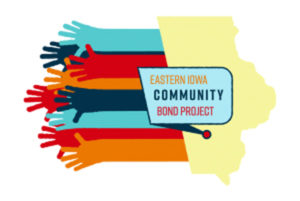By Barb Arland-Fye
The Catholic Messenger
Families whose lives were disrupted by the immigration raid earlier this month in Mount Pleasant desire one thing above all: to get their detained loved one back. For many, that means securing the funds needed to post bond, usually set at $10,000, an almost impossible dream.
 That’s where the Eastern Iowa Community Bond Project comes in. The Bond Project, established a year ago, “exists to support families seeking the release of their loves ones from detention,” according to its website. “Immigration bond has been set at $10,000 for most cases, and while many workers will be requesting a hearing to lower the amount, the bond will still remain out of reach for many families.”
That’s where the Eastern Iowa Community Bond Project comes in. The Bond Project, established a year ago, “exists to support families seeking the release of their loves ones from detention,” according to its website. “Immigration bond has been set at $10,000 for most cases, and while many workers will be requesting a hearing to lower the amount, the bond will still remain out of reach for many families.”
On May 9, 32 men were arrested at the Midwest Precast Concrete Facility in Mount Pleasant for alleged immigration violations. To date, eight men’s families had assembled the bond to get their loved one out of custody, representatives of the Bond Project said. The men are being held at multiple detention centers, including Hardin County Jail in Eldora, Iowa; Linn County Jail in Cedar Rapids, Iowa; and Rock Island County Jail in Rock Island, Ill.
A “Free Them All: Bond Campaign for the Mt. Pleasant Workers” has been launched to raise the money for bond-eligible workers detained in the raid. In a statement, Bond Project representatives said that bonding people out of immigration detention reunites families and buys immigrants the time needed to save money for legal representation and prepare a strong case in immigration court.
Persons who are not bond-eligible include those with a criminal history, “arriving aliens” or people with certain removal orders (even if the orders are defective).
Julia Zalenski of the Bond Project said that as long as bond remains set, a person could post at any time while his/her case is pending. But, “the sooner bond can be posted the better both to minimize the harm to the detainee and their family and to better prepare for their case.” Persons in deportation proceedings have the right to contest charges against them and to apply for different forms of relief from deportation.
Posting bond slows down the deportation process and allows immigrants to return home to their families, to work in their communities and to obtain legal representation while their case is pending. A backlog of immigration cases means that individuals may have years before their cases are heard. “The hope is that with adequate legal representation and assistance, individuals are able to figure out a remedy or eventual pathway to U.S. citizenship,” Bond Project representatives said.
Persons interested in assisting the Bond Project can take the following actions:
• Make donations to the Bond Project, a volunteer-run 501(c)(3) nonprofit.
Funds can be donated online at communitybondproject.org/ donate, or by checks made out to the Eastern Iowa Community Bond Project, P.O. Box 3174, Iowa City, Iowa, 52344-3174.
• Consider asking your parish to sponsor the bond for one detained immigrant through the Bond Project’s Memorandum of Understanding (MOU) process.
• Learn more about immigration detention and how it affects immigrants and their families in our communities. The Bond Project can come and share its work with interested parish members.
Since its founding in April 2017, the Eastern Iowa Community Bond Project raised almost $40,000 to release detained immigrants. That money resulted in the bonding out of eight Iowa immigrants from detention. To date, the Bond Project had raised an additional $60,000 specifically to bond out immigrant workers detained in the Mount Pleasant raid. More funding is needed to “ensure that every bond-eligible worker is released,” Bond Project representatives said.
The Bond Project works in partnership with other community organizations assisting with the response to the Mount Pleasant raid, including Iowa WINS of First Presbyterian Church in Mount Pleasant, the Center for Worker Justice of Eastern Iowa, American Friends Service Committee of Iowa, League of United Latin American Citizens, the University of Iowa College of Law Legal Clinic, Justice for our Neighbors, Iowa Coalition Against Sexual Assault and Catholic Charities.
“They’re doing a wonderful job of trying to raise money for bond and lining up lawyers to help,” Father Paul Connolly said of the Bond Project. He is pastor of St. Alphonsus Parish in Mount Pleasant, where several families of detainees worship. The parish raised $11,000 for general assistance to the families of the detainees during a second collection earlier this month, Fr. Connolly said. Future collections are possible, because the need “is not going to go away in a week or two.”
The Bond Project is an organization well worth supporting, added Father Bernie Weir, who celebrates Mass in Spanish the second Sunday of each month at the Mount Pleasant parish. He is pastor of St. James Parish in Washington, which has also donated to the general needs of families impacted by the Mount Pleasant raid. The Diocese of Davenport contributed $5,000 from the annual Works of Charity collection. “We’ve heard from other parishes that are intending to take up a second collection,” said Kent Ferris, director of the diocese’s Social Action Office.
For more information about the Eastern Iowa Community Bond Project, visit the website: communitybondproject.org. To consider sponsoring the bond for one detained immigrant, send an email to info@communitybondproject .org) or call (319) 535-2209.
Facts about Iowa immigrants
About 160,000 Iowa residents are immigrants (5 percent of the state population). More than 60,000 Iowa immigrants are naturalized citizens, 40,000 are undocumented immigrants and the other 60,000 are in the U.S. on various forms of visas or a green card. Some immigrants who are undocumented entered the country with visas and stayed past the expiration date, some entered with no status, and some arrived as children with no knowledge of their immigration status.
Many undocumented immigrants are part of mixed-status families, or households that include immigrants with visas, legal permanent residents, naturalized citizens and U.S. born citizens. Nearly 60,000 Iowans live with an undocumented family member. Nearly 40 percent of undocumented immigrants in Iowa live with U.S. citizen children under 18.
“Undocumented immigrants enrich Iowa communities, raising their children, and contributing to Iowa’s economy. Undocumented immigrants in Iowa paid an estimated $37 million in state and local taxes in 2014.”
(Source: Eastern Iowa Community Bond Project)











